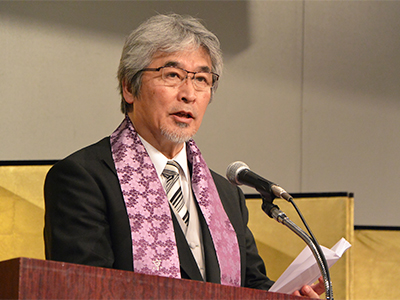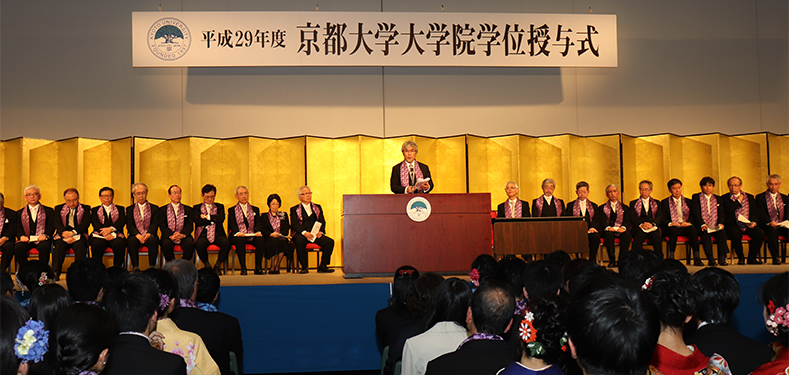Juichi Yamagiwa, 26th President

Today, Kyoto University is proud to award master's degrees to 2,207 students, professional master's degrees to 151 students, juris doctor degrees to 129 students, and doctoral degrees to 555 students. 382 of the students receiving their degrees today are from outside Japan. Let me begin by offering my sincere congratulations to all of you on your accomplishments.
With today's ceremony, Kyoto University will have awarded, to date, master's degrees to 78,812 students, professional master's degrees to 1,690 students, juris doctor degrees to 2,121 students, and doctoral degrees to 44,078 students. On behalf of the Vice-Presidents, Deans, Directors, and Leading Graduate School Program Coordinators here today, and all the other faculty and staff, congratulations to each and every one of you on receiving your graduate degrees.
At Kyoto University, master's and doctoral degrees are granted in 22 different fields of specialization, such as the "Doctor of Letters". Six years ago we also began offering Leading Graduate School Programs, and the students who have completed them will receive degree certificates specifying these programs. I am genuinely proud and delighted that you have worked so hard to hone and perfect your skills, learning from and inspiring one another day and night, in all of these fields of study. Today's conferment ceremony is both a destination you have been working toward and the launching pad for your future. I hope that the academic degrees awarded today will be of great help to you in carving out your career paths.
A transformation is taking place in the world today whereby the information society is being superseded by an ultra-smart society. Information and communication technologies making use of artificial intelligence are set to transform all types of information into data, creating networks that closely integrate humans and things. Self-driving vehicles enabled with driver monitoring systems and smart city sensing, product identification using cameras and AI, multilingual machine translation, disaster information analysis — all kinds of new technologies are being developed in rapid succession. AI may even be able to process massive volumes of data to help pinpoint causes of illness, formulate and apply appropriate treatments, and enable medical robots to perform operations safely. These advancements are sure to greatly aid in the creation of safe environments.
Today, however, safety cannot be equated with peace of mind. Peace of mind comes from having a circle of people you can trust. No matter how safe the place you are in, if you are betrayed by your friends, you will quickly find yourself in danger. While blessed with a wealth of information, we also live today in an insecure society where individuals are isolated and have to contend with various risks on their own. We cannot rely on AI to help us spend quality time with friends. I believe that such experiences are deeply rooted in our bodies and utterly at odds with the pursuit of efficiency. We need to envisage an ultra-smart society that can shrewdly incorporate this human dimension. This will require profound learning that transcends the boundaries between the arts and sciences, and expansive knowledge that ranges freely through time and space. Some predict that in about ten years' time, around one half of today's jobs will be performed by AI. I hope that all of you receiving degrees today will take full advantage of the superior capabilities you have cultivated here at Kyoto University, and find ways to flourish in these complex times.
Looking through the report on the dissertations for which students are receiving degrees today, I noted that, as would be expected of Kyoto University, many of them describe basic research on a wide variety of common phenomena. I also noticed, however, that there are also quite a few studies related to recent developments in the world. Examples include cross-cultural encounters resulting from globalization, multiculturalism, human migration, movement of goods, global-scale climate change, natural disasters, rethinking legal and economic systems to adapt to rapid social changes, and new methods of treatment for mental illness and a number of other medical conditions. The common thread running through all of these works is that they apply incisive analysis to ongoing problems and unresolved issues, yielding fresh evidence and proposals for resolution. I am sure that these proposals, grounded as they are in reliable data and deep analysis, will serve as important guideposts for the future. There are many studies with enticing titles that made me want to read on and learn about the research described, and other dissertations containing outstanding research far beyond my capacity for understanding. I am awed by the diversity of the fields covered, and positive that such diversity, creativity, and vision will lead to world-changing concepts and innovations.
What kind of spirit have you honed through your years of research here? Reflecting on this question, you may realize that you have gained from Kyoto University something that may not be readily available elsewhere.
This year marks the 100 th anniversary of the birth of Kenichi Fukui, graduate of the Faculty of Engineering at Kyoto Imperial University (currently Kyoto University) and the first Japanese to receive the Nobel Prize in Chemistry. As a professor at the Faculty of Engineering's Department of Fuel Chemistry (later the Department of Hydrocarbon Chemistry), a position he assumed in 1951, Fukui published the Frontier Orbital Theory, making a profound impact on the world of chemistry. He thus became the third KyotoU-affiliated Nobel laureate, after Hideki Yukawa and Shinichiro Tomonaga, who both received the Nobel Prize in Physics. The red-brick building where Fukui taught, originally a part of the Third Higher School, precursor to Kyoto Imperial University, is preserved to this day on the Yoshida Campus.
It is said that the foundations for Professor Fukui's prize-winning work lay in the KyotoU Faculty of Engineering's traditional emphasis on basic research. Engineering research and education generally tend to be practically orientated, and the fact that both Kyoto University and the University of Tokyo — Japan's oldest national universities — have had these since their founding is often regarded as a reflection of the government's practice-focused higher-education policy. Tracing the life of Professor Fukui, however, brings to light an academic world entirely different from this general image of engineering.
Born in Nara Prefecture, Fukui loved learning Japanese language and history as an elementary school student. He keenly read all of Natsume Soseki's works, and dreamed of becoming a historian. But he was also fond of the natural world around him, joining the biology club in middle school and becoming engrossed in the collection of plant and insect specimens. Fukui says that his juvenile encounters with nature not in academic literature but as direct, real-life experiences helped him cultivate the "scientific intuition" that would prove so important to him in formulating new theories of chemistry in later years.
At senior high school he practiced kendo , traditional fencing, and enjoyed mathematics, but if anything struggled in chemistry classes. A major turning point came when his father introduced him to Genitsu Kita, then a professor of Kyoto Imperial University's Department of Industrial Chemistry. "If you like math, you should do chemistry": this is what Professor Kita told the young Fukui. At the time, chemistry was regarded as an empirical discipline requiring laboratory experiments, and as a university science subject recommended for those who disliked mathematics. In Professor Kita's advice to do precisely the opposite, Fukui sensed a keen insight into the future of chemistry, and was inspired to study the subject under his tutelage. The professor repeatedly impressed upon Fukui the need to do basic research in order to pursue applied work.
At that time, students in the Department of Industrial Chemistry, a part of the Faculty of Engineering, were required to take courses in the Faculty of Science's Department of Chemistry. Having completed a variety of foundation courses in chemistry, however, Fukui decided that the fundamentals of his studies lay not in chemistry itself but in physics, and thus began to focus on the latter discipline, especially quantum mechanics. Quantum mechanics was still a new field of study at the time, and Fukui recalls reading original works in German and thinking about how he would like to devise a more mathematical approach to chemistry in the future.
One of Professor Kita's leading protégés, Shinjiro Kodama, also strongly advocated the need to study basic sciences, despite it being the postwar era when supplies and facilities were scarce. He joined Fukui and others in free and vigorous discussion, where teachers and pupils together ventured to the farthest horizons of theoretical physics. This profound interdisciplinary discussion ultimately bore fruit in the form of Fukui's Frontier Orbital Theory.
Academic work requires a sensitivity to the era in which one lives. What Kenichi Fukui's story tells us, however, is that regardless of your academic discipline, it is always essential to have a wide-ranging education and a solid grasp of fundamentals. The capacity to discover uncharted areas and new topics can be nurtured through experiences of playing in natural surrounds as a child, and of gaining knowledge in fields different from one's own.
Today, however, the approach to science throughout the world seems to have become rather uniform, with a tendency to be tied to technology and emphasis on producing innovations with immediate application in society. I believe that it is important for all researchers to look beyond their own academic disciplines, incorporating a broad range of knowledge from other fields, including the arts, and each developing an individual sensibility and scientific intuition.
I am confident that during your research life here at Kyoto University, each one of you has cast your eyes over many different fields and developed your own distinctive world through vigorous dialogue with others. That is testimony to your studies at Kyoto University, and will be a priceless asset in your life from here on. Moreover, your dissertation is the ultimate gift you can give to future generations, and the footsteps you are leaving behind will serve as a guide for those who come after you. I believe that the value of these gifts will be determined by whether or not you can proudly uphold the social literacy you have earned as KyotoU alumni. The recent spate of research misconduct has drawn fierce criticism from the wider public. I hope that each one of you will rely on your strength of spirit and experience as researchers nurtured at Kyoto University, and go on to pursue brilliant careers.
Once again, let me offer my sincere congratulations to each and every one of you here today.


